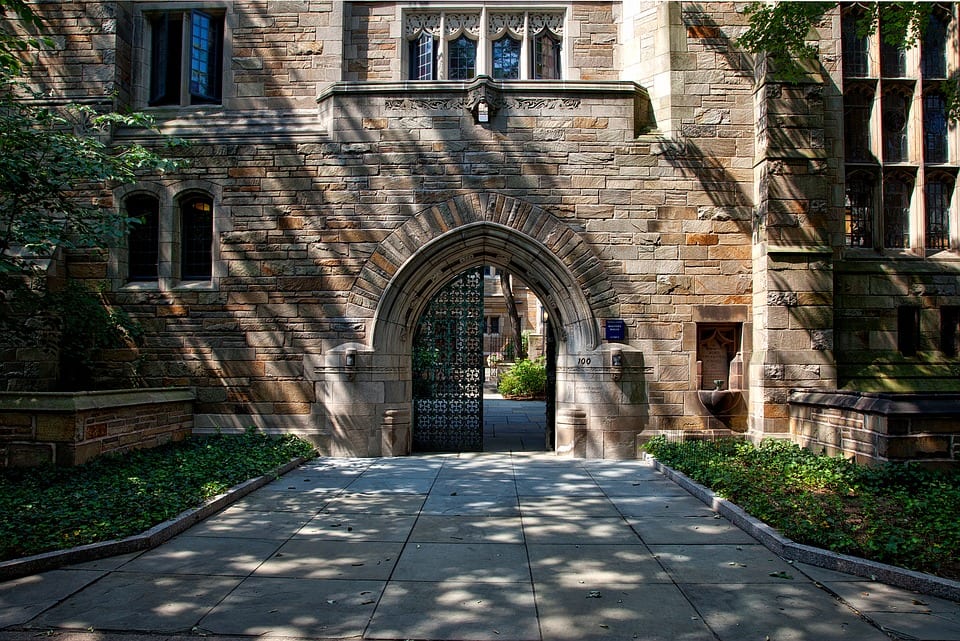The department issued a finding of fact, which asserts that Yale favors African-American and Latinx applicants with lower scores than their White and Asian-American counterparts.
A Justice Department investigation has found that Yale University discriminates against White, Asian, and Asian-American applicants.
The announcement could spell trouble for both Yale and Harvard University.
Harvard, as LegalReader.com previously reported, was similarly sued for privileging race in its admissions process.
In lawsuits against Harvard and Yale alike, plaintiffs alleged that the colleges consider applicants’ ethnicities over pertinent predictors of academic success, such as grade point averages and standardized test scores.
In both cases, the Justice Department has put its support behind plaintiffs alleging racial discrimination.
And now, late this past week, the head of the Justice Department’s Civil Rights Division—Eric S. Dreiband—issued stringent orders to Yale University. Dreiband, says WSHU Public Radio, informed Yale that his department had analyzed college-provided data and concluded that the school discriminates against White and Asian applicants.
Dreiband, notes WSHU, had earlier pledged to make oral arguments in the case against Harvard. While that lawsuit was found baseless by a lower court, it is currently on appeal.
Michaele Turnage Young, an attorney with the NAACP Defense and Education Fund, told WSHU that the Department of Justice’s moves against Harvard and Yale are disturbing.

“Issuing factual findings against a university as well known as Yale, taking the significant step of saying the head of the civil rights division will argue in the Harvard case at the appellate level… it has a chilling effect on universities,” Turnage Young said.
While Yale has repeatedly claimed complaints against its admissions process are baseless, the Asian-American Coalition for Education—alongside dozens of other advocacy groups—has maintained that the Ivy League needs more transparency.
Swan Lee, one of AACE’s co-founders, said a Justice Department investigation—and potentially even a Justice Department lawsuit—may make the difference in forcing Yale to reconsider its practices.
“If it really goes to that step, I think it will be good for the transparency of the quality of admissions,” Lee told The Harvard Crimson. “In a lawsuit, Yale probably has to provide its internal admissions data so that the scholars can analyze it and examine it. So having this data will be very valuable for Americans to know what is going on in admissions.”
Despite Lee’s hopes and the Justice Department’s finding of fact, Yale President Peter Salovey said on Thursday that the university’s admissions processes comply with existing federal law and will not be changed for the upcoming academic year.
Regardless of what Salovey says, however, Lee’s supposition does echo Dreiband and the Department of Justice’s findings.
“Asian American and White applicants,” the agency wrote, “have one-tenth to one-fourth of the likelihood of admission as African-American applicants with comparable academic credentials.”
Nevertheless, some Asian-American students have said they do not support AACE or the Justice Department’s actions against affirmative action.
Catherine Ho, a rising Harvard senior, told WSHU Public Radio that when she started her admissions application, she would have to put in extra effort.
“I identify as Asian-American, but more specifically, Vietnamese-American,” Ho told WSHU. “My parents and family are refugees, and I wrote about the importance of the Vietnamese language in my essay to Harvard College.”
Ho said she can easily understand why some Asian-American applicants who were rejected by Harvard, Yale, or other prestigious universities may feel they have been discriminated against. But she cautioned against notions of discarding affirmative action outright, arguing that race impacts most every aspect of an individual’s life—including, presumably, privileges which afford access to higher-quality secondary schools and educational preparatory programs.
“Meritocracy,” Ho told WSHU, “is so alluring to so many people.”
“The model minority myth is perpetuated within and outside of many Asian American communities,” she added. “There’s certain groups trying to use Asian Americans as a racial wedge, and I, as an Asian American, feel compelled to speak out.”
Ho, notes WSHU, wants schools like Harvard and Yale to have a holistic admissions process. She said that the Asian-American community is diverse—and among all of the United States’ ethnicities, it has the highest level of intragroup income inequality.
Ho, says WSHU, hopes that Yale considers students’ entire profile when evaluating their applications: their family’s income, background, and race.
Sources
DOJ Discrimination Claims Against Yale Echo Harvard Admissions Lawsuit
DOJ Issues Discrimination Findings Against Yale Amid Harvard Admissions Investigation, Lawsuit
Harvard Does Not Discriminate Against Asian-Americans in Admissions, Judge Rules


Join the conversation!